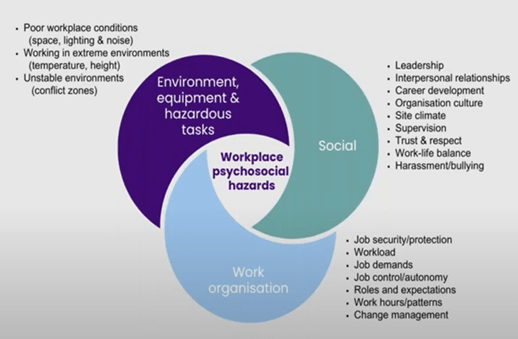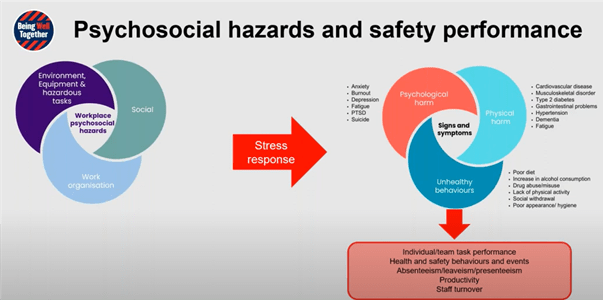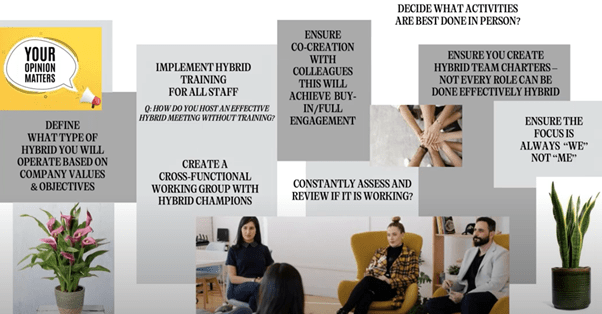Last month, an array of speakers presented on critical topics on wellbeing at the British Safety Council Wellbeing conference, held virtually and chaired by its Director of Wellbeing, Stephen Haynes. Here, we take a look at some of the main topics discussed at the event…
Wellbeing strategies
Jonathan Gawthrop, Executive Director for Wellbeing, Sustainability & Assurance at EMCOR UK began the keynote sessions focusing on creating effective wellbeing strategies at work.
Gawthrop explained how the pandemic has accelerated the discussion of wellbeing and mental health, but questioned who is responsible for wellbeing within an organisation.
He noted that in many organisations wellbeing experts are consolidated into a HR function, but added that “every part of the organisational system has the responsibility for creating the right environment which enables individuals to flourish, experience good wellbeing and therefore be as productive as they can possibly be for the organisation, becoming a kind of self-fulfilling prophecy”.
Gawthrop also urged businesses not to approach wellbeing as a project on the side, adding: “Undertake a wellbeing strategy as part of an overall cultural change programme within an organisation and do not try and have it as some distinct project that sits outside of what an organisation does.”

As an example, he discussed that within his own company, all areas of EMCOR have responsibility for wellbeing, including supply chain relationships. He said that it is ‘essential’ to be able to learn from all areas of the business and operations.
Gawthrop added that ISO 45003, a framework on guidance to manage workplace mental health, should be used together with ISO 45001 to identify psychosocial hazards.
 ‘Critical’ areas of consideration for ISO 45003 are putting the psychosocial hazards into a work environment. He highlighted three main topics:
‘Critical’ areas of consideration for ISO 45003 are putting the psychosocial hazards into a work environment. He highlighted three main topics:
- how work is organised, including elements such as your role being the same as advertised, demand and control of work tasks, remote working and workload
- social factors at work such as work relationships, a feeling of purpose or fulfilment, support, trust and inclusion,
- and lastly, work environment equipment and hazardous tasks – such as equipment being right and appropriate for the job, other environment factors such as heat, noise and generally feeling safe at work.
These are hazards which, Gawthrop said, could have ‘detrimental risks’ to wellbeing at work if not assessed and monitored.

Psychological safety and wellbeing
Dr Audrey Fleming, Wellbeing Health & Safety Auditor and Consultant, British Safety Council, followed on from this by speaking about team dynamics within a workplace in relation to safety performance.
Avoiding blame and seeing failure as learning is part of psychological safety at work, Fleming said. She added that leadership can directly influence the culture of a firm by encouraging employees to be innovative, trusting others and using failures as a learning experience.
Fleming explained how psychological health and safety is examining the elements in the workplace that are causing stress: “workplace psychological hazards should be looked at along with the physical safety risk assessments”.
Psychological hazards can then begin to build up as stress if left unassessed – “over a period of time if there’s no intervention, no support, then this can manifest”.

This can in turn lead to negative affects for a business such as individual or team performance, absenteeism and staff turnover.
She urged organisations to combat this by preventing, promoting, and protecting their workforce, through safety risk assessment.
“It’s not just the case of having employee assistance programmes and providing counselling, it’s understanding that within the workplace – the work design, the people you work with, the supervision, the leadership can have a detrimental impact and impact on safety performance.”
Hybrid working – Does it work for all?
In her keynote session, Bex Moorhouse, Founder and Director, of Invigorate Spaces focused on the hybrid working debate .
She explained that hybrid working has many different interpretations and urged organisations to define what their individual version of hybrid is before implementing policies.
Moorhouse stated the many benefits of hybrid working including home/work life balance, less work burnout and the ability to take more microbreaks, along with time and financial savings on work commute. From a company perspective, Fleming mentioned benefits including: increased productivity, increased company loyalty and cost savings with a reduced workspace.
However, Fleming also noted that there were negative impacts of hybrid working for some. These included an increased feeling of loneliness and isolation; where employees felt less connected to company culture, and that learning is much harder to do remotely than in the office.
According to data collected, Fleming added that HR teams have said when people are working remotely more often, it’s harder to spot talent for career progression.
From an employer perspective this lack of involvement into the wider company can mean reduced loyalty to a business and more costs associated with training and implementing hybrid working – which may be challenging for HR as well as additional work.
Fleming also looked at the physical work environment: “When we think about the physical office environment…fewer desks appear when you implement hybrid working, so that meant when people were going into the office, they were suddenly having to share desks instead of having their own desk. Again, from a wellbeing perspective how do we you ensure that the ergonomic set up is correct for employees if they’re not always using the same desk”.
She added: “As an employer you still have the same health and safety responsibilities for people working at home as you would do for any other worker… you still need to make sure from a HSE perspective that you’re doing the workplace assessment, that you’re advising on good posture, ensuring that people have adequate lighting etc, and that your creating risk assessments – a lot of people forget that actually they still need to cover this off as part of their health and safety responsibilities.”

Fleming advised businesses to ask employees for their opinions via cross working groups with ‘hybrid champions’, focusing on what style of hybrid suits the company and its values, as well as implement hybrid training for all staff.
She also suggested organisations should constantly assess and review if the current strategy is working via polls and questionnaires and to ensure the focus is on ‘we not me’. This helps to switch the narrative from solo working to teamwork, which can naturally have employees come into the office to work together when it works best.
Overall, Fleming concluded that there is more positive data and outlook on hybrid working than negative, but that employees like having a choice for what suits them, where “choice attracts and retains the best talent”.
The day also included prominent keynote speakers and topics including:
- Dr Julie Riggs, Senior Head of Education, British Safety Council, who examined the impact of indoor air quality on occupant’ cognitive function, productivity and wellbeing
- Marcus Herbert, Head of Wellbeing, British Safety Council, who headed the session ‘The real business case for workplace wellbeing’
- Chris Armstrong, Wellbeing Programme Manager, Mercedes-AMG PETRONAS Formula One Team who discussed wellbeing for human performance
- Sarah Meek, Managing Director, Mates in Mind who looked at a maturity pathway towards improved mental health in the workplace
You can now watch any of the recorded sessions from the British Safety Council Wellbeing Conference here.
The Safety Conversation Podcast: Listen now!
The Safety Conversation with SHP (previously the Safety and Health Podcast) aims to bring you the latest news, insights and legislation updates in the form of interviews, discussions and panel debates from leading figures within the profession.
Find us on Apple Podcasts, Spotify and Google Podcasts, subscribe and join the conversation today!

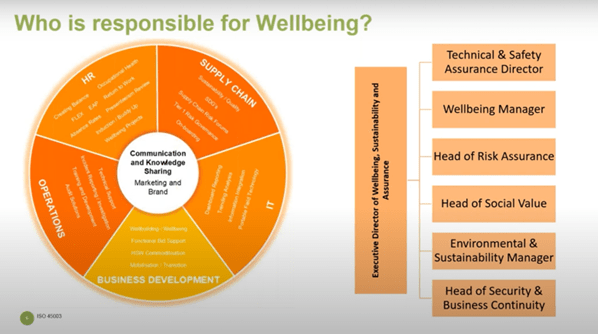
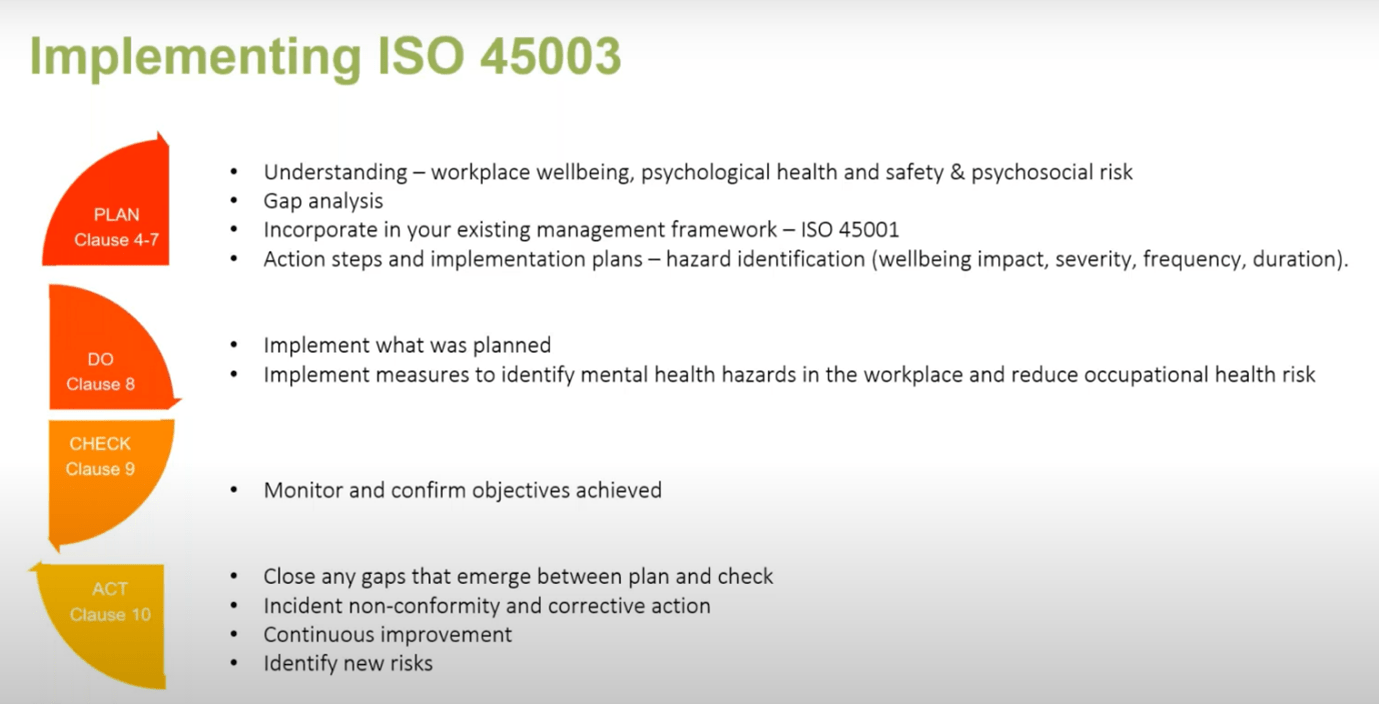 ‘Critical’ areas of consideration for ISO 45003 are putting the psychosocial hazards into a work environment. He highlighted three main topics:
‘Critical’ areas of consideration for ISO 45003 are putting the psychosocial hazards into a work environment. He highlighted three main topics: